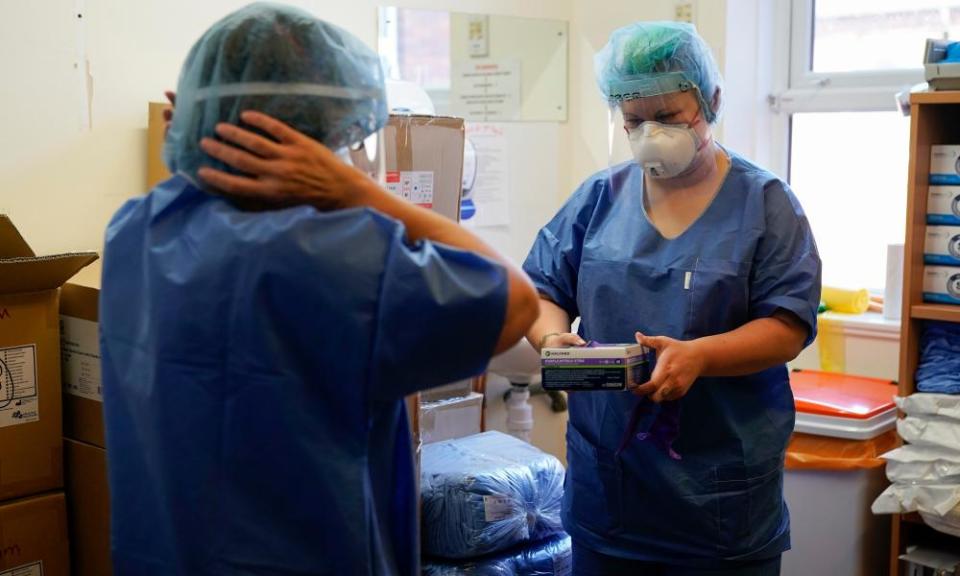Revealed: NHS denied PPE at height of Covid-19 as supplier prioritised China

The NHS was deprived of large amounts of protective gear at the height of the coronavirus outbreak after a French company contracted to supply millions of masks allegedly prioritised more lucrative deals with deep-pocketed clients including a Chinese state-owned energy company.
A joint investigation by the Guardian and the French news website Mediapart has uncovered evidence suggesting the mask manufacturer Valmy failed to fulfil the terms of a £1.2m contract with the NHS to supply about 7m masks in the event of a pandemic.
According to the contract, Valmy was required to respond rapidly to the NHS order and begin deliveries within weeks.
However, documents seen by the Guardian and Mediapart suggest that rather than prioritising the NHS the company increased production for other customers as mask prices soared. A person familiar with Valmy’s negotiations with the NHS said it waited “quite a long time before responding to the NHS’s request because they could sell at far better prices on other markets”.
The disclosures raise questions about the UK government’s reliance on “just in time” logistics to supply personal protective equipment (PPE) in a pandemic situation. The arrangements, common in the manufacturing and retail sectors, were introduced in 2017 to reduce the cost of maintaining a large PPE stockpile.
According to two senior NHS procurement officials, “just in time” PPE contracts encountered significant difficulties in the early days of the Covid-19 outbreak. Amid a surge in global demand for PPE, the guarantees to supply the NHS were at the mercy of chaotic international supply chains, ruthless market practices and protectionism.
“All of the comfort blankets we thought we had basically went up in flames,” one of the officials said.
Valmy’s contract with the NHS was dealt a further blow in early March when the French government issued a decree requisitioning stocks of respirator masks. Valmy is understood to be under investigation in France in connection with alleged violations of the decree.
default
Laurent Suissa, the managing director of Valmy’s Paris-based parent company, Segetex, said he had “no comment to make” in response to the Guardian and Mediapart’s detailed questions about Valmy’s operations and its dealings with the NHS. He said the company was cooperating with French investigators and was “in no way worried about the outcome of the investigation”.
A spokeswoman for the Department of Health and Social Care (DHSC) insisted “just in time” contracts had been used successfully in the pandemic. “We have taken every possible step to secure PPE so that those working on the frontline of this global pandemic are properly protected.”
Under the terms of its NHS contract, signed in January 2017, Valmy was required to deliver almost 7m FFP3 respirator masks to the UK at 17p per mask in a pandemic situation as soon as the order was activated. “Time shall be of the essence,” the contract stated.
On 3 February, three days after the World Health Organization declared a global public emergency, the NHS formally activated the contract. At this point, documents suggest, Valmy was ordered to begin making deliveries to the UK within three weeks. Deliveries were scheduled across nine weeks to distribute masks across the UK’s PPE stockpiles.
Almost three weeks after activation, Valmy informed the NHS that its factory in France was experiencing “significant delays” due to labour shortages and machinery issues, emails show. “It’s frustrating we can’t keep up with global demand,” the company said, “but rest assured we are prioritising the NHS and other national health providers.”
However, documents suggest that around the same time Valmy’s factory was prioritising the production of millions of masks for other clients.
According to the documents, Valmy and Segetex agreed an order of 2.1m N95 masks with CGN Energy, a subsidiary of the large Chinese state-owned nuclear power company CGN. Emails suggest CGN made a number of visits to Valmy’s factory in February to collect its orders, which it said were delivered to Wuhan.
The involvement of the Chinese government in the deal remains unclear, but in March vehicles with diplomatic registration plates are believed to have arrived at Valmy’s factory near Lyon. It is understood one of the vehicles was registered to the Chinese diplomatic service, while another was registered to a nuclear fusion facility where CGN operates.
Neither CGN nor the Chinese embassy in Paris responded to requests for comment.
Data suggests Valmy did not begin manufacturing the kind of FFP3 masks it promised the NHS until late February, and in the four weeks after the contract’s activation the majority of Valmy’s operations were focused on producing N95 masks, made to meet Chinese safety standards, rather than FFP3s for the NHS.
Valmy’s UK head of sales, Graham Rix, defended the company’s handling of the NHS contract. “Like any situation when you are faced with demand from a number of different customers – because remember, the NHS isn’t the only customer Valmy has – you have to prioritise the orders,” he said. “Any capacity that we had, as far as I was aware, was going to the French government.”
However, official documents suggest the French government did not confirm any orders with Valmy’s parent company until 11 March, shortly after a sweeping requisition decree seized respirator mask stocks across the country.
Rix accepted there had been issues with the NHS contract, but said Valmy had delivered 1.3m masks to the NHS in the past four weeks. “We will be delivering significant volumes going forward now that we have increased our capacity with the factory,” he added.

 Yahoo Finance
Yahoo Finance 